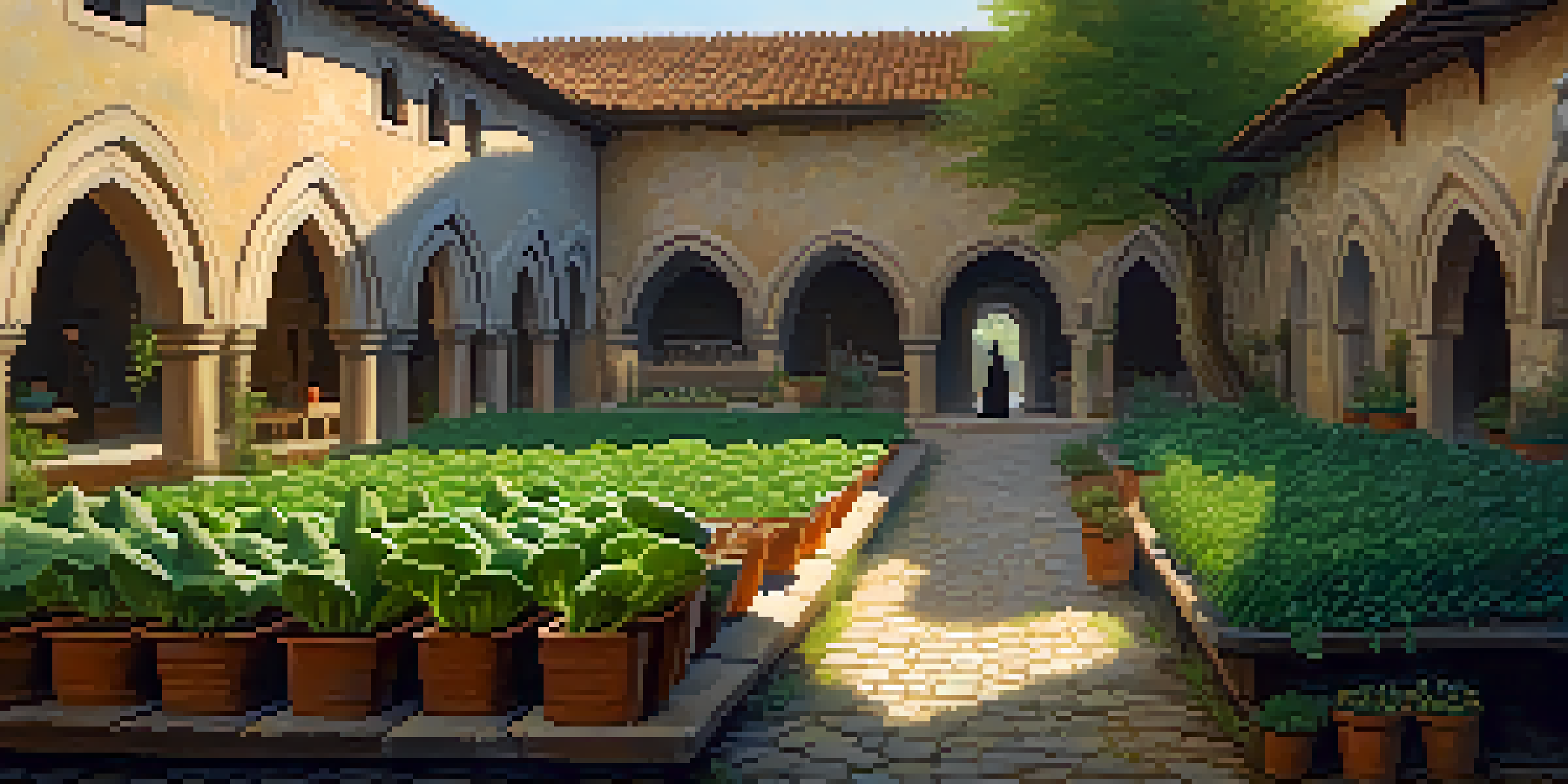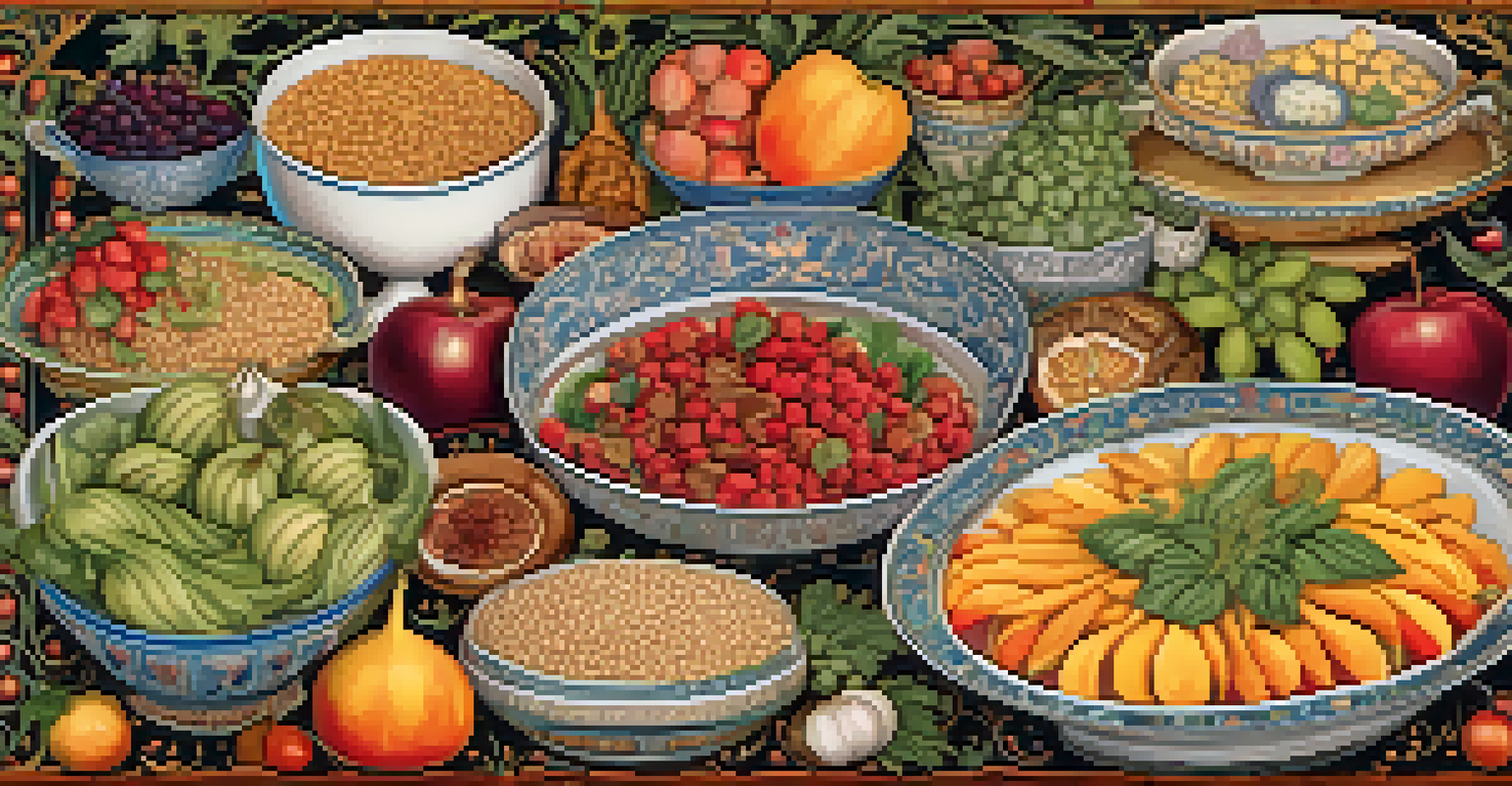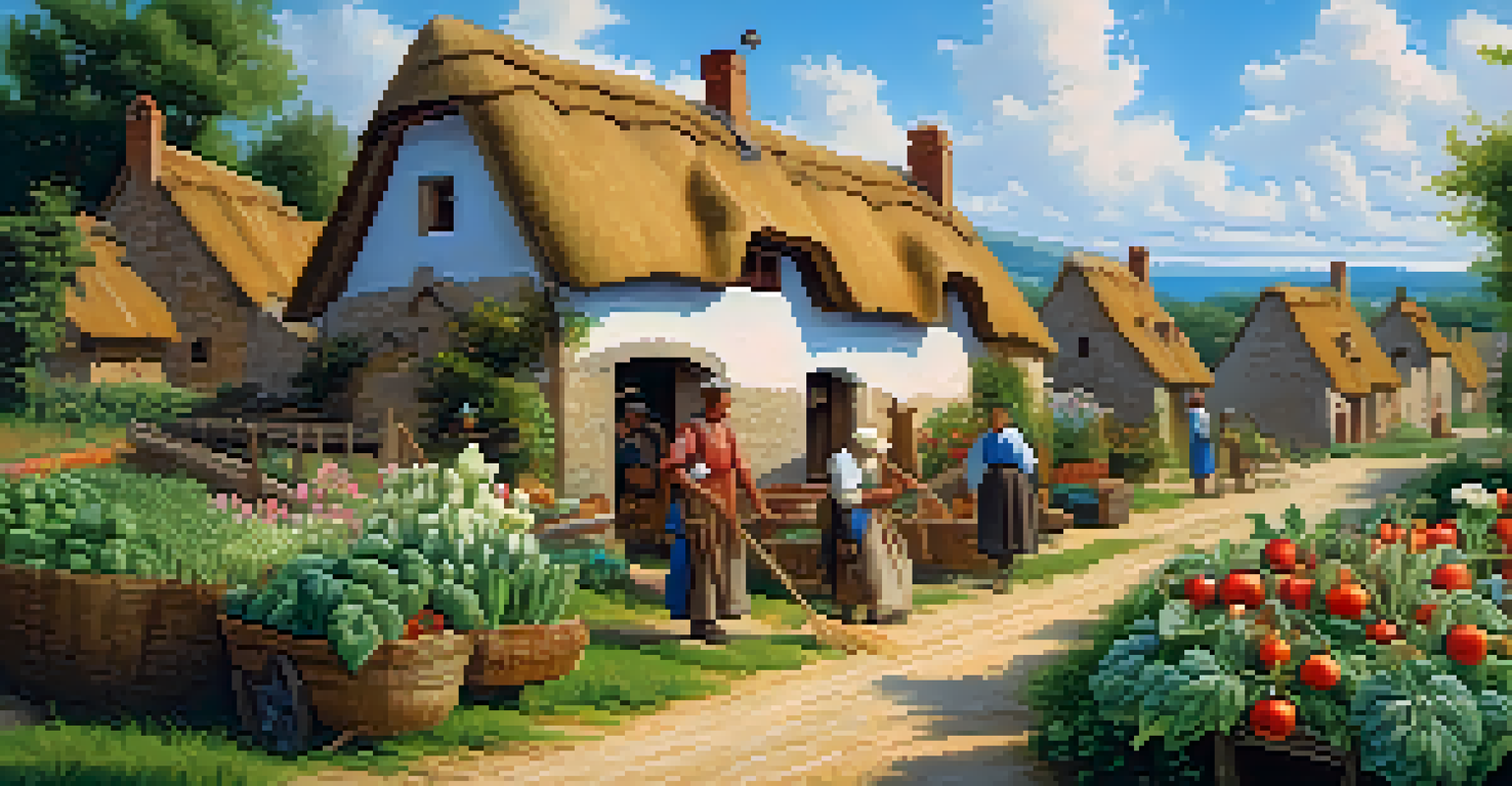The Evolution of Vegetarianism During the Middle Ages

Understanding the Roots of Medieval Vegetarianism
Vegetarianism during the Middle Ages had deep philosophical and religious roots. Many early Christians believed that abstaining from meat was a way to purify the soul and practice self-discipline. This idea was often reinforced by the teachings of prominent figures like Saint Augustine, who emphasized the importance of temperance in one's diet.
The diet of a monk is a reflection of his spiritual journey, as it is a path of purification and self-discipline.
Additionally, the influence of Eastern religions, such as Buddhism, began to seep into European thought, introducing concepts of compassion towards all living beings. This cultural exchange helped shape the attitudes of some medieval Europeans towards vegetarianism. As a result, the practice started gaining traction among certain monastic communities, who adopted strict diets to reflect their spiritual beliefs.
However, it is important to note that vegetarianism was not uniform across Europe. Different regions and cultures had varying interpretations of dietary restrictions, leading to a rich tapestry of practices and beliefs that evolved over time. This variation set the stage for how vegetarianism would be perceived and practiced in the centuries to come.
The Role of Monasticism in Promoting Vegetarianism
Monastic communities played a pivotal role in the evolution of vegetarianism during the Middle Ages. Monks adhered to strict dietary codes, often avoiding meat on certain days as a form of penance and spiritual reflection. These practices were not merely personal choices; they were public demonstrations of faith and commitment to a higher calling.

Many monastic orders, such as the Benedictines, emphasized a lifestyle of simplicity and humility, which extended to their meals. This led them to adopt vegetarian diets, focusing on grains, legumes, and vegetables. The monks' dedication to these principles meant that they often became the custodians of agricultural knowledge, cultivating crops and sharing their bounty with local communities.
Philosophy and Religion Drive Choices
Medieval vegetarianism was deeply rooted in philosophical and religious beliefs, emphasizing compassion and self-discipline.
Through their influence, the vegetarian diet began to spread beyond monastery walls. This not only affected the dietary habits of local populations but also contributed to the idea that a meat-free diet could be both spiritually fulfilling and socially responsible. Thus, monasticism served as a crucial catalyst for the vegetarian movement during this period.
The Influence of Religious and Ethical Beliefs
During the Middle Ages, various religious and ethical beliefs influenced people's dietary choices. Christianity, in particular, emphasized the importance of compassion and stewardship of God's creation. This belief system encouraged many to consider the ethical implications of consuming meat, leading some to adopt vegetarian practices.
Compassion towards all living beings is not just a virtue; it is a profound ethical choice that shapes our very identity.
Moreover, the medieval concept of 'just war' and the associated beliefs about killing animals for food began to conflict with the emerging notions of mercy and kindness. Philosophers like Aquinas weighed in on these discussions, leading to an increasing awareness of the moral dimensions of food choices. These debates contributed to a growing acceptance of vegetarianism among certain circles.
As a result, some individuals began to view their diets as a reflection of their ethical beliefs. This shift not only affected personal eating habits but also began to reshape societal views on what it meant to live a virtuous life. Consequently, vegetarianism became intertwined with broader discussions about morality and ethics during the Middle Ages.
Economic Factors Shaping Dietary Choices
Economic circumstances played a significant role in the evolution of vegetarianism during the Middle Ages. Food scarcity was a common issue, particularly during famines or periods of war. In such times, meat was a luxury that many could not afford, leading to a reliance on plant-based diets.
Additionally, the feudal system meant that access to resources was often limited. Peasants, who made up the majority of the population, were typically more inclined to adopt vegetarian diets simply due to economic necessity. This pragmatic approach to food choices often resulted in families consuming what they could grow or gather, which frequently included vegetables and grains.
Monasteries Fostered Plant-Based Diets
Monastic communities played a crucial role in promoting vegetarianism, adopting plant-based diets as expressions of their faith.
Over time, these economic realities shaped cultural attitudes towards vegetarianism. Rather than being seen solely as a dietary choice for the pious, it became a practical lifestyle for many. This blend of necessity and belief laid the groundwork for a more widespread acceptance of vegetarianism in medieval society.
The Renaissance and a Shift in Dietary Perspectives
As the Middle Ages transitioned into the Renaissance, a shift in dietary perspectives emerged. The Renaissance was a time of renewed interest in arts, sciences, and humanism, leading to a reevaluation of traditional beliefs, including those about food. This period saw a growing curiosity about the human body and its needs, which changed how people thought about their diets.
With the advent of new agricultural practices and discoveries, more diverse food options became available. This allowed for a more balanced diet, which included both plant-based and animal products. As people began to embrace this diversity, vegetarianism started to lose some of its earlier religious connotations and became more of a personal choice.
Furthermore, the rediscovery of classical texts from ancient Greece and Rome introduced ideas about health and nutrition that encouraged moderation in all things. This helped to foster a more nuanced view of vegetarianism, allowing individuals to explore their dietary preferences without the strict moral frameworks that had previously dominated medieval thought.
Vegetarianism in Literature and Culture
Literature and cultural narratives during the Middle Ages also played a role in shaping perceptions of vegetarianism. Texts from this era often reflected the values and beliefs of the time, with some authors championing meatless diets as symbols of virtue and asceticism. These narratives helped to elevate vegetarianism from a personal choice to a cultural statement.
For instance, various saints' lives recounted stories of individuals who practiced vegetarianism for spiritual reasons, thus inspiring others to consider such diets. These accounts often depicted vegetarians as paragons of virtue, reinforcing the idea that abstaining from meat could lead to a closer relationship with the divine.
Economic Factors Influenced Diets
Economic circumstances often led to plant-based diets being a practical choice for many, particularly during times of scarcity.
Moreover, the rise of folk tales and allegories often featured characters who embodied the virtues associated with vegetarianism. This cultural representation helped to normalize the practice and make it more accessible to the general populace, contributing to the gradual evolution of vegetarianism during the Middle Ages.
The Legacy of Medieval Vegetarianism
The legacy of vegetarianism in the Middle Ages laid the groundwork for future dietary movements. The ideas and practices established during this time continued to influence individuals long after the medieval period ended. By intertwining ethical, economic, and spiritual beliefs with dietary choices, medieval vegetarians created a framework that would inspire later generations.
As the Renaissance blossomed into the Enlightenment, the conversations around food continued to evolve. The groundwork laid by medieval vegetarians encouraged further exploration of ethical eating and the health benefits of plant-based diets. This ongoing dialogue ultimately helped shape contemporary discussions about vegetarianism and veganism.

Today, many of the principles that emerged during the Middle Ages resonate with modern values surrounding food sustainability and ethical consumption. The journey of vegetarianism through this historical period reminds us of the complex interplay between culture, religion, and food choices—a conversation that continues to evolve into the present day.